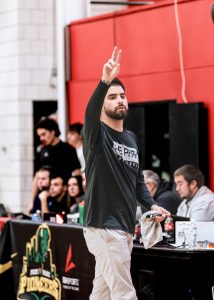In order to make political progress, we must learn to listen to each other better
March 15, 2023
I want to highlight a conversation I feel is necessary to have within our current political landscape. We have become complacent as our political culture has been hollowed out. We live in a time that incentivizes quick, emotion-driven interactions where insults and a desire to “win” are at the center of our socialization with each other. We have lost our capabilities to understand each other, make genuine human connections, and realize that we are all Americans at the end of the day. We’re now led to believe that people different from us politically are not only wrong, but that they are evil. Their candidate of choice, we’re told, will destroy our country before our eyes if elected to office. We’re letting our echo chambers, often online spaces in which we surround ourselves with voices that affirm our beliefs and make it harder to hear other perspectives, paint pictures of people on the other side that are, from my experience, largely disingenuous. Our nation is at a crossroads, and I see two futures facing us.
Future A is one in which we make no changes to our current approach to political discourse. We continue to become more divided, distrustful, and jaded. We continue to let social media and internal forces drive a wedge between red and blue America. The loudest and most radical voices on each side push middle America to disengage from our democracy, causing future generations to lose hope in the promise of this country. One of America’s greatest strengths is our freedom to openly disagree with each other and our government, to let those ideas clash against one another, and still be friends at the end of it all. Losing this freedom, or the will to exercise it, would be devastating for our future. The culture war will likely continue to leak into every facet of life. Political violence will escalate to higher levels. We possibly face a second Civil War. This sounds alarmist, but I don’t think this bleak future is far out of reach if we decide to stay on the path we are walking currently.
Future B, on the other hand, is the future that would be beneficial for America. This is a future in which the 87% of Americans who are tired of political division (according to a study conducted by YouGov and StartsWithUs) finally stand up and say enough is enough. We will not continue down the path of derision, hatred, and reactionary politics. We will work with our fellow Americans to foster a sense of trust and community that we lost somewhere along the way by reviving the commitment to understanding and mutual respect. This future is one in which the 87% comes together to bridge the political gap between the left and the right, one that isn’t nearly as wide as we’ve been made to believe by the media. We work to rebuild a political culture that incentivizes viewpoint diversity, genuine human connection, and nuanced conversations.
Building this future will not be easy, and there’s a lot of work to do. With this, I want to provide a few starting tips I’ve learned on my personal journey as a political bridge-builder to begin achieving a better future for America.
First, we need to change our mindset and approach to political interactions. Political debates have become increasingly popularized due to their entertaining nature, with social media feeding us with videos of liberals getting “destroyed” with facts and logic, with conservatives getting “owned” by exposing their blatant hypocrisy. This approach does not solve problems. If we want to foster these human connections and understanding, I believe that we all desperately need to adopt a new mindset. The most important part of this mindset is simple; prioritize dialogue over debates. Debates have winners but winning should not be our main goal. If we approach these dialogues with the desire to change peoples’ minds, we minimize the benefits of genuine conversations. Dialogue values active listening, an agreed upon goal of building understanding, and moving past disagreements in order to both enter and leave a discussion as friends. We have to remember that conversations are starting points and we need those avenues of communication to stay open. Find solutions where you can, and where you can’t, do your best to understand why and move on.
Secondly, we need to get back to the why. I think social media has caused us to reduce our opinions and talking points down to quick, snappy, often weak statements. As a result, nuance has been thrown to the wayside. There’s a three layered breakdown of everyone’s stance in a political interaction that has given me new perspectives and insight into why people believe the things they believe. The first layer is someone’s basic statement of their belief (e.g. “I’m pro-life”), we’ll call this their position. This is where a lot of interactions fall short and verbal conflict begins. There’s no happy ending to this scenario and makes future interaction very difficult. The second layer dives into an individual’s experiences, whether personally or vicariously through someone else. Asking someone about the experiences that led them to being pro-life can aid in learning about another’s reasoning, bringing their own humanity back into the conversation. This second layer we’ll call experience. Although these layers are significant, the third and final layer is the most important: Everyone’s experiences [which results in their position] fulfills a basic human need. Some needs could be safety, comfort, fond memories, or bad ones. It could be a moral fulfillment, or something learned at a young age, and the list goes on. Breaking down everyone’s views into positions, experiences, and needs brings nuance back to the table.
Finally, we need to stay humble. It’s very easy to sit in our echo chambers and hear people who agree with us talk about how the other side is clearly crazy, delusional, or just flat out wrong. People on opposite political sides of an issue could be just as confident as you, and it’s possible that you’re missing a piece of the puzzle. It’s also possible that you’re wrong, or both of you are. Be patient, hear them out, and try to see where they’re coming from. It can be hard when someone says something that we view as blatantly stupid or hateful to keep our cool, but try, instead, to retrain yourself to ask what you might be missing. Try and make your first instinct to ask a question about what their concerns are about X issue or why they voted for Y politician. Remember, even if you are right you have no hope of changing someone’s mind unless you understand where their beliefs are stemming from and you build a foundation of trust and mutual respect. But to truly humble yourself is to understand that you can be wrong as well and building a friendship with someone you disagree with may challenge both of your ideas and enrich your worldview. We need to be fearlessly curious in our pursuit of understanding each other, even if we will never agree.
I’m sharing these tips that I’ve learned because they have changed my life. I’m not claiming to be an expert on any of this, I’ve spent the last two years being dissatisfied with our political culture, and the last year of my life trying to be a part of the solution. Personally, I believe we’re more similar than we are different. We all suffer from the human condition and we are all having human experiences. I am of the belief that facts don’t change minds, friendships do. If we want to inspire and bring about social and political change, whether you’re on the political right, left, or somewhere in the middle; we need to learn to meet people where they are and get back to making genuine human connections with each other.



















